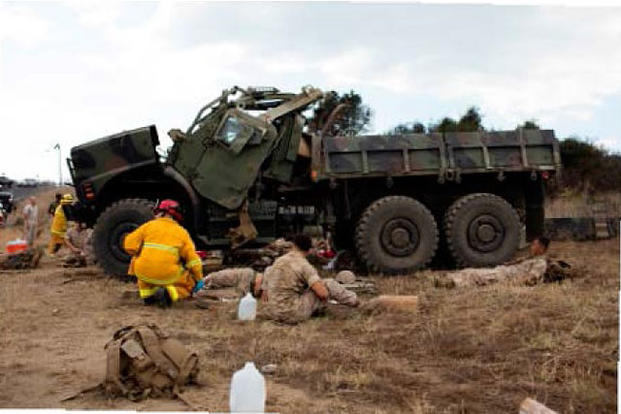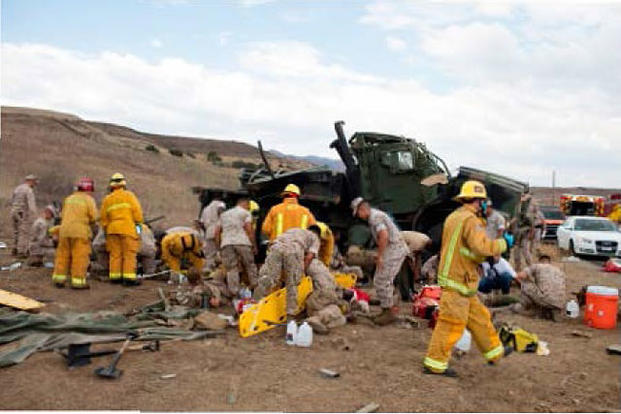The driver of a 7-ton truck that overturned at Camp Pendleton, California, in 2015 is expected to face court-martial later this year on a charge of negligent homicide.
Cpl. Bin Guo, 27, of 1st Light Armored Reconnaissance Battalion, is accused of failing to slow down when the truck took a turn, resulting in a crash that killed one Marine, 21-year-old Cpl. Bryan Lauw, and injured 18 more, some critically. But his military attorney says there's no evidence he did anything wrong.
At an Article 32 investigative hearing Jan. 12, the preliminary hearing officer found there was no probable cause to charge Guo, a military official with knowledge of the case told Military.com. But the convening authority for the case, 1st Marine Division Commander Maj. Gen. Daniel O'Donohue, decided to overrule the officer's recommendation and send Guo to general court-martial on the charge.
Negligent homicide is the lowest level of military homicide charges. It does not require proof of malicious intent, only the absence of "due care" resulting in a death.
"This is simply a horrible accident. He didn't have any intent for this to happen," Guo's military attorney, Maj. Nelson Candelario, told Military.com. "He didn't act in any way that was negligent."
The rollover took place just after 1:30 p.m. on Sept. 10, 2015. Guo, a motor vehicle operator, had been tasked with transporting a number of 1st LAR Marines to and from the range for their annual rifle qualification, according to a military police report obtained by Military.com.
He was making a return trip from the Camp Horno range to Camp Las Flores, where 1st LAR was based, traveling southeast along Pendleton's Basilone Road. Aboard the camouflage-colored Oshkosh 7-ton were 17 shooters who had just completed qualifications, Guo, and one other Marine assigned to help with the transport.
Shortly after passing the Camp Las Pulgas ammunition supply point, the driver took a curve and apparently lost control of the vehicle. The right rear side of the 7-ton hit a guardrail. As Guo worked to regain control, the truck ran off the roadway, slamming into a wooden electrical pole.
"From there, I think the back of the 7-ton then slid left, and at some point began to roll," the Marine assisting Guo, whose name is redacted, wrote in a witness statement. "We rolled about three times. Once we stopped moving, I was still in the cab. I looked over to see if the others were OK, but the Marine in the center was gone and the driver was hanging out of his door."
Police photographs of the site paint a grim scene.
The truck, which eventually settled upright, sustained severe damage to the cab and bed, and Marines lay everywhere, hurt and bleeding. Lauw died at the scene as a result of blunt force trauma in the crash. Others sustained severe injuries, including spinal fractures, head trauma, facial lacerations and brain bleeds. The injured were transported to six local medical facilities for treatment, one in a medically induced coma.
The police report indicates Guo may have taken the curve too fast. The curve had flashing speed reduction signs and a limit of 35 miles per hour. Police investigators note Guo apparently did not slow down when entering it, and that he had been advised on previous days by his passengers to drive more slowly. But the report also leaves open the possibility that the 7-ton's brakes may not have functioned properly in the turn.
"It is undetermined if the brakes located on the front axle of [the vehicle] were functioning prior to the collision, or became defective afterwards," the report states. "As a result, the cause of the collision cannot be determined at this time."
Guo, who was knocked unconscious by the crash, said he did not remember leaving the range or any following events until he woke up in San Diego's Palomar Hospital, according to a statement included in the report.
A trial date for Guo is expected to be set after the conclusion of another Article 32 hearing, taking place Thursday, on an unrelated speeding charge, an official said.
If convicted of negligent homicide, he could face up to several years in confinement.
-- Hope Hodge Seck can be reached at hope.seck@military.com. Follow her on Twitter at@HopeSeck.




























